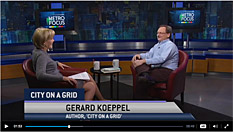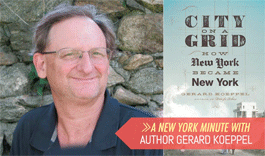City on a Grid: How New York Became New York
Da Capo Press, 2015
336 pages
Hardcover, 978-0306822841
You either love it or hate it, but nothing says New York like the street grid of Manhattan. Created in 1811 by a three-man commission featuring headstrong Founding Father Gouverneur Morris, the plan called for a dozen parallel avenues crossing at right angles with many dozens of parallel streets in an unbroken grid. Hills and valleys, streams and ponds, forests and swamps were invisible to the grid; so too were country villages, roads, farms, and estates and generations of property lines. All would disappear as the crosshatch fabric of the grid overspread the island: a heavy greatcoat on the land, the dense undergarment of the future city.
No other grid in Western civilization was so large and uniform as the one ordained in 1811. Not without reason. When the grid plan was announced, New York was just under two hundred years old, an overgrown town at the southern tip of Manhattan, a notorious jumble of streets laid at the whim of landowners. To bring order beyond the chaos—and good real estate to market—the street planning commission came up with a monolithic grid for the rest of the island. Mannahatta—the native “island of hills”—became a place of rectangles, in thousands of blocks on the flattened landscape, and many more thousands of right-angled buildings rising in vertical mimicry.
The Manhattan grid has been called “a disaster” of urban planning and “the most courageous act of prediction in Western civilization.” However one feels about it, the most famous urban design of a living city defines its daily life. This is its story.
“ Rarely does one come across a book that makes you rethink the city you thought you knew … . Koeppel’s masterful story-telling does that and more.”
— Kate Ascher, author of The Works: Anatomy of a City
“ If Manhattan has a subconscious, it’s the angular numbered street plan that, for two centuries, has informed the island’s destiny. Koeppel does a masterful job of telling the little-known story behind this humble yet hallowed grid. Along the way, he introduces a vivid cast of characters and spins some lively anecdotes. A thoroughly enjoyable read, and one that will cause you to view Manhattan with fresh eyes.”
— Justin Martin, author of books about a pair of New York eminences, Walt Whitman and Frederick Law Olmsted
“ I’ve spent most of my life walking the straight lines of the world’s greatest city, and have never thought to ask: Is this a different shape from other cities, and if so, why, and who did it? Koeppel’s book answers these questions, in an easygoing, good-humored manner, with interesting facts unearthed on nearly every page. This is one of those books you always wished would be written, and here it is. Indispensable for anyone interested in the history of New York and cities generally, and bound to fuel cocktail conversations up, down, and across the city for years to come.”
—David Duchovny, actor, author, native New Yorker
New York Genealogical & Biographical Record – January 17, 2016 PDF
The Real Deal New York Real Estate News LINK
Winner 2015 New York City Books Awards LINK
Selected for Books on the Subway LINK
The Midwest Book Review LINK
Phi Beta Kappa The Key Reporter LINK
“Paul Goodman, America’s own grand and innovative social thinker . . . called for a new genre of letters, one that City on a Grid will augment”
Portland Book Review – January 25, 2015
By Seniye Groff READ
San Francisco Book Review – January 21, 2016
By Karen Collins READ
The Roanoke Times – January 17, 2016
By READ
“Koeppel is the very best sort of writer for this sort of history.”
Roth on Wesleyan blog – January 14, 2016
By Michael S. Roth, president of Wesleyan University READ
The New York Times Sunday Book Review The Short List – January 8, 2016
By Mason B. Williams READ
“… the best account to date of the process by which an odd amalgamation of democracy and capitalism got written into New York’s physical DNA.”
Shepherd Express “All About America: New books examine who we are, how we got here.” – December 15, 2015
By David Luhrssen READ
“New York historian Gerard Koeppel brings poetry to a seemingly prosaic topic, rejoicing over every numbered avenue that gained a name and wondering whether the city’s spirit of rationalism will gradually make way for a more organic way of life.”
The Bowery Boys ten favorite New York City history books of 2015 – December 22, 2015 READ
“Koeppel takes us into the motivations for creating this mighty, orderly system and the methods in which they were plowed — sometimes violently — through the topography of New York. Even its imperfections (like that original lack of a large open space) are fascinatingly told here.”
Planetizen – Top 10 Books of 2015 – December 12, 2015 READ
The Wall Street Journal – December 11, 2015
by David Freeland READ
(not inside the wsj pay wall? google: koeppel grid wsj — the first result will be the article; click on it and you should get in)
The New York Times – Bookshelf – December 11, 2015
by Sam Roberts
“Prodigiously researched… an engaging storyteller” READ
New York Journal of Books – November 10, 2015
by Richard Rivera
“Koeppel unfolds a well-researched ambitious tale of intrigue intertwined with political significance…” READ MORE
Les Architectures – November 28, 2015
by Eliane “Where does this grid come from anyway?” READ
Open Letters Monthly: an Arts and Literature Review – October 5, 2015
Review by Steve Donoghue
“Anyone who’s ever felt the grid slowly clarifying inside their own head should read this fantastic book and find out how it all came to be.” READ MORE
The Internet Review of Books – November 6, 2015
Broiling (Mad) on the Grid by Marty Carlock
““Civic folly,” “blank imbecility,” a “man-trap of monstrous dimensions,” “mechanical dullness” – what exactly has invoked such invective? (…) Koeppel also blames right angles for spawning the bane of New York drivers: gridlock.” READ MORE
The New Yorker – October 5, 2015
Naked Cities: The death and life of urban America.
By Adam Gopnik
“The foundation of the city is its spatial organization, the way its streets meet and the way its citizens travel on them. Gerard Koeppel’s “City on a Grid” (Da Capo) tells the too little-known tale of how and why Manhattan came to be the waffle-board city we know. He shows us that the grid, far from being a long-range plan imposed by a class of managers, was the result more of a shrug, an inconclusive meeting, and a big “Why not?” READ MORE
Kirkus Review – August 15, 2015
“…. Koeppel delivers all this with great verve and humor, leaving readers to decide whether the grid is the brilliantly democratic, effective plan its architects thought or the dull and ugly manifestation of unimaginative minds ruled by commerce.
For Manhattanites, surely, and for anyone who’s visited and been either charmed or overwhelmed by the grid.” READ MORE
Publisher’s Weekly
“Historian Koeppel (Bond of Union) continues his examinations of New York–centric infrastructure with a look at the story behind the development of New York City’s extraordinary 1811 street grid plan, which “defined the urbanism of a rising city and nation.” Devastated by the 9/11 attacks, Koeppel launched his expert investigation into what made the city special…” READ MORE
New York Post – Page 6 – September 15, 2015
Our grid, for better or worse by Cindy Adams
“Inconveniences? Congestion. Limited light, solar energy, air, greens, drainage. ” READ MORE PDF
RELATED STORIES
WNYE-TV/NYC Vibe – January 24, 2017 VIDEO
New York Public Library talk on January 17, 2017 VIDEO
Gotham blog – January 4, 2017 READ
Hartford Courant letter writer cites City on a Grid for some political reality checking READ
The company one keeps… in the research stacks…
New York Public Library Archives – TWEET
PBS Thirteen – Metrofocus VIDEO
How NYC’s Roads Were Mapped Out
Interview with Mary Alice Williams – February 16, 2016
The Mic 92.1 – Books and Beats LISTEN
December 27, 2015

Talking Grid at Mather High School (matherhsnyc.org) as part of the Association of American Publishers’ Adopt-a-School program
“Local Authors Paired with NYC Schools for Weeklong Adopt-a-School Program”
Association of American Publishers, article by Marisa Bluestone, December 15, 2015 READ

New York Daily News “Is Vision Zero humanly possible?” READ
 77 WABC Radio: Right Now with Doug McIntyre LISTEN
77 WABC Radio: Right Now with Doug McIntyre LISTEN
(from 9:15 to 18:00 in the audio file)

WGDT-FM The Morning Show LISTEN
![]() Kera radio – “Think” LISTEN
Kera radio – “Think” LISTEN
“Putting New York on the Map”
WAMC Northeast Radio
Conversation with Joe Donahue about “City on a Grid” LISTEN
Bookish
“Three Things Veteran New Yorkers Might Not Know About Their City”
READ
6 SqFt
“A New York Minute With Gerard Koeppel”
READ




